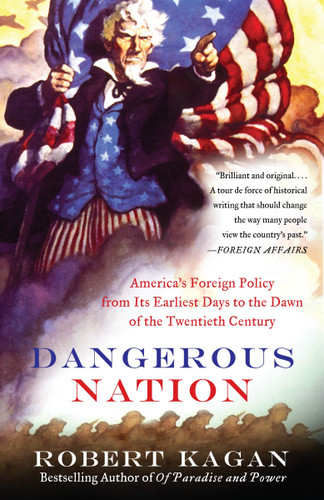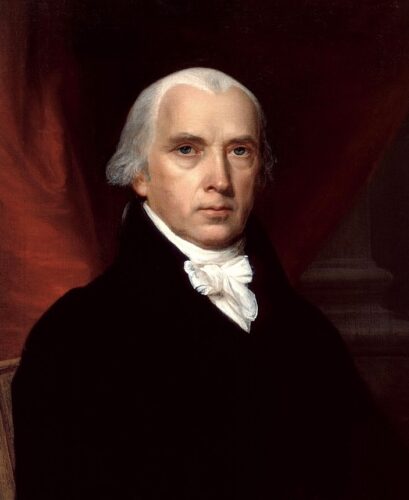Bruce Fein says Robert Kagan is convinced the U.S. has yet to metamorphose the world into paradise because of insufficient appreciation of its omnipotence, omniscience and benevolence, as outlined in Kagan’s 2006 neocon book Dangerous Nation.

U.S. personification Columbia in a World War I patriotic poster. (Paul Stahr, Herbert Hoover Library, National Archives and Records Administration, Public domain)
By Bruce Fein
Special to Consortium News
 If you love fairy tales with happy endings, you’ll swoon over Robert Kagan’s Dangerous Nation’s fictional portrayal of America’s foreign policy from its earliest days to the dawn of the 20th century as a chivalrous aspiration or quest to bring Camelot to every corner of the globe.
If you love fairy tales with happy endings, you’ll swoon over Robert Kagan’s Dangerous Nation’s fictional portrayal of America’s foreign policy from its earliest days to the dawn of the 20th century as a chivalrous aspiration or quest to bring Camelot to every corner of the globe.
The narrative veers from truth like the geocentric theory of the universe veers from the heliocentric.
According to Kagan, the gravitational pull of America’s foreign policy has always been a selfless giving and risking that last full measure of devotion to bring foreigners enlightened self-government and prosperity.
The author posits that Americans uniquely enjoy angelic DNA. They weep like Niobe upon witnessing foreigners groaning under oppression and eagerly champion American military intervention, i.e., the legalization of first-degree murder, to alleviate or end their misery.
Cervantes’ Don Quixote is put to shame. Americans, Kagan insinuates will go straight to heaven without the need of an interview with God!

The fabulist nature of Kagan’s story is underscored by the heartlessness Americans were displaying at home over lynchings, white male supremacy, subjugation of Native Americans and rampant racism while purportedly acting like fairy godmothers abroad up to 1900.
The tale is as implausible as if the anti-Christ in Uncle Tom’s Cabin, Simon Legree, volunteered to fight to emancipate slaves in Cuba or Brazil.
Kagan is convinced that the United States has yet to metamorphose the world into paradise because of insufficient appreciation of its omnipotence, omniscience and benevolence in exhibiting every noble instinct of the human heart. (Was someone asleep at the switch in composing the book title conveying the opposite impression?)
If Kagan sounds like a megaphone for the multi-trillion-dollar military-industrial- security complex and the alternate history of America Uber Alles, it’s because he is. The truth about the United States and its foreign policy is both more earthbound and more promising.
The United States Constitution, ratified in 1788, is the nation’s birth certificate. James Madison, father of the Constitution, is the greatest discoverer in history — greater even than Copernicus, who discovered the heliocentric theory of the universe, and greater than Isaac Newton, who discovered the theory of universal gravitation.
Madison discovered how to make Isaiah’s prophecy about turning swords into plowshares a reality to end the scourge of war and make neutrality the nation’s lodestar. He conceived of a separation of powers that entrusts the war power in Article I, section 8, clause 11, exclusively to Congress with no incentive to exercise it except in self-defense — the Hope Diamond of the Constitution. No other constitution lodges the war power exclusively with the legislative branch.
History has more than amply vindicated Madison. Congress has declared war in only five conflicts in more than 234 years and only when convinced (by presidential deceits in 1846 and 1917) that a foreign aggressor had already broken the peace.
Neutrality in foreign conflicts is constitutionally saluted because war is the greatest nemesis to liberty. As Cicero noted, in times of war, the law falls silent. Everything is subservient to national security: due process, equal protection, privacy, private property, free speech, and freedom of religion. Madison warned, “No nation can preserve its freedom in a state of continual warfare.”

Prominent neoconservative scholar Robert Kagan in 2018. (Brookings Institution, Flickr, CC BY-NC-ND 2.0)
The Constitution’s architects understood that the temptation to war to placate an inherent craving for power is universal. It can be arrested only by placing the war power exclusively with the legislature — a talking shop with a temperament of a Golden Retriever.
Men are not angels, James Madison underscored in Federalist 51. The cardinal sin is an insatiable ambition for power as an emblem of self-esteem or amour propre. The craving is a substitute for philosophically empty souls who dominate the species. Its prime gratifications are hormonal, not cerebral, with power at the apex. As former national security adviser and secretary of state Henry Kissinger acknowledged, “Power is the ultimate aphrodisiac.”
War over straws is the great temptation of all nations for the psychological high that comes with dominating others, like a master’s over a slave. The temptation becomes irresistible when the war power is entrusted to the executive branch. It possesses an incentive to manufacture existential threats, i.e., magnify fleas into elephants, to aggrandize power. Madison elaborated:
John Vanderlyn’s portrait of James Madison, one of the authors of the Federalist Papers and the fourth president of the United States. (White House Historical Association, Public domain, Wikimedia Commons)
“In no part of the constitution is more wisdom to be found than in the clause which confides the question of war or peace to the legislature, and not to the executive department… [T]he trust and the temptation would be too great for any one man: not such as nature may offer as the prodigy of many centuries, but such as may be expected in the ordinary successions of magistracy. War is in fact the true nurse of executive aggrandizement. In war a physical force is to be created, and it is the executive will which is to direct it. In war the public treasures are to be unlocked, and it is the executive hand which is to dispense them. In war the honors and emoluments of office are to be multiplied; and it is the executive patronage under which they are to be enjoyed. It is in war, finally, that laurels are to be gathered, and it is the executive brow they are to encircle. The strongest passions, and most dangerous weaknesses of the human breast; ambition, avarice, vanity, the honorable or venial love of fame, are all in conspiracy against the desire and duty of peace.”
The Constitution’s makers disputed Jean-Jacques Rousseau’s fantasies about the perfectibility of man. As Thomas Jefferson put it, “[I]n questions of power then, let no more be heard about confidence in man, but bind them down from mischief by the chains of the constitution.”
Madison amplified, “ambition must be made to counteract ambition.” They were steeped in Voltaire’s Candide about cultivating your own garden and avoiding Nicholas Bottom’s desire in A Midsummer Night’s Dream to play all the parts in a play.
President George Washington’s Farewell Address speaks volumes about American neutrality absent a declaration of war by Congress:
“The great rule of conduct for us in regard to foreign nations is, in extending our commercial relations, to have with them as little political connection as possible. So far as we have already formed engagements, let them be fulfilled with perfect good faith. Here let us stop.”
Washington had earlier acknowledged,
“The Constitution vests the power of declaring war in Congress; therefore, no offensive expedition of importance can be undertaken until after they have deliberated upon the subject and authorized such a measure.”
Kagan absurdly dismisses the Farewell Address as a limited sotto voce opposition to America favoring France over the United Kingdom in a European-wide conflict instead of a general summons for neutrality. The Neutrality Act of 1794 signed by Washington two years earlier had universal application. The Farewell Address was intended to live for the ages, not to die after one news cycle.
Congress authorized the quasi-war with France under John Adams to protect American shipping from predation, not to pursue empire. A defense treaty with France was nullified by statute in 1798, and no other defense treaty was ratified until NATO in 1949.
Other Nations’ Independence
Contrary to Kagan, the United States remained faithful to the Constitution’s foreign policy of neutrality, reinforced by the Neutrality Act, while the founding fathers remained politically ascendent. As Secretary of State John Quincy Adams boasted in a July 4, 1821, address to Congress,
“She has, in the lapse of nearly half a century, without a single exception, respected the independence of other nations while asserting and maintaining her own. She has abstained from interference in the concerns of others, even when conflict has been for principles to which she clings, as to the last vital drop that visits the heart.”
The United States did not intervene in the multiple wars of insurrection against Spain and Portugal in Central and South America from 1808-1826. When Greece clamored for military assistance in its 1821 War of Independence against the Ottoman Empire, Congressman John Randolph of Virginia upbraided Senator Daniel Webster for urging United States intervention to defend liberty all over the world as transgressing “every bulwark and barrier of the Constitution.”
The Congressman preached: “Let us say to those seven millions of Greeks, ‘We defended ourselves, when we were but three millions, against a Power in comparison to which the Turk is but as a lamb. Go and do thou likewise.’”
The United States grew and prospered while forging policy of neutrality and in engaging in war only when declared by Congress in self-defense — as with the War of 1812 to end Great Britain’s industrial scale kidnappings of American seaman and flagrant violations of neutral rights to trade in non-contraband goods with belligerents.
Manifest Destiny was summoned into being in the 1840s to give birth to the deceit that Americans were God’s new chosen people. The intellectually vacuous slogan begot the 1846-1848 Mexican-American War fueled by a presidential lie about an American soldier killed on American soil.
Then Congressmen John Quincy Adams and Abraham Lincoln voted against the war. In January 1847, a Whig-controlled House voted 85-81 to censure President James K. Polk for having “unnecessarily and unconstitutionally” initiated the war.
Union General and later President U.S. Grant who had served as quartermaster in the conflict wrote: “I was bitterly opposed to the measure, and to this day regard the war, which resulted, as one of the most unjust ever waged by a stronger against a weaker nation.”
Manifest Destiny marked the beginning of a counter-revolution on the installment plan against the Constitution’s foreign policy of neutrality. The war power has been unconstitutionally transferred to the president through a combination of congressional abdication and executive usurpation, a development celebrated by Kagan.
The results have yielded more dystopia than utopia. But that is a topic for another day. .
Bruce Fein was associate deputy attorney general under President Reagan and research director for the Joint Congressional Committee on Covert Arms Sales to Iran. His twitter feed is @brucefeinesq. His Substack feed is brucefein.substack.com. His website is www.lawofficesofbrucefein.com
The views expressed are solely those of the author and may or may not reflect those of Consortium News.


Excellent article ! Putting into context how a nation that grew gradually into a puritanical stance after its violent earlier foundings got its relatively benign initial policy orientations hijacked midway and got commandeered by a power greedy cabal bent on abusing American strengths in the pursuit of covert hegemony under cover of spreading freedoms and democracy across the world. It is sad to note that the illustrious American founding fathers and their highly enlightened visions got post-humously upended and subverted by power greedy rascals. Only the American people acting in concert can win back and recover their original benign heritage. The alleged Dangerous Nation must be saved from the misguiding hands of the repeatedly proven Dangerous Rogues at its helm !
Absolutely phenomenal but profoundly illogical, anti-intuitive, confounding and embarrassing to the whole nation that such a hateful, destructive, bigoted cast of crazy warmongers were allowed to so thoroughly insinuate themselves into the central corridors of power in both the Republican and Democratic Parties, to the point where, even if the electoral power of the political dyad is completely flipped in the latest election cycle, these maniacs will retain their offices, their influence, and their entire catechism of poisonous and divisive political “principles,” if one may use that term. These creatures can seemingly go from breathing oxygen to chlorine gas or hydrogen cyanide and back without missing a breath. No doubt that Madame Nuland routinely expresses sentiments to “f-word” the US as freely and frequently as her infamous quote directed at the EU. She and her special interest group use this country’s resources, especially its bloated military, for priorities distinctly different from those of the majority of its citizens.
Thank you Bruce Fein for revealing who the devil’s were/and still are, apparently, in our troubling history who managed to outflank the wiser ones: the ones who would be appalled to come back today to see what misery we have wreaked on this world, courtesy of people like Robert Kagan and his side kicks – wife, NEOCON, Cheney trained, Victoria Nuland.
Robert Parry wrote this article about these creatures:
“A Family Business of Perpetual War”
https://consortiumnews.com/2015/03/20/a-family-business-of-perpetual-war/
IMO, R. Kagan’s either delusional/nuts or he’s a greedy, deceptive, manipulating globalist hegemon, unelected by the American people who are victimized by his twisted thinking that surprise, surprise serves Raytheon, Boeing, Northrop Grumman, General Dynamics and the rest….Nancy Pelosi was shocked to hear that she, as a member of Congress, should not be allowed to trade stocks…no conflict of interest there…
If we tweak Kagan’s views and credentials just a bit, then he may line up well with China’s recent views of the U.S. HEGEMON.
We can nudge Brookings description a bit from “PROMINENT scholar” in the photo to the more accurate “PROMINENT belly” for starters.
And we can adjust his perception: “According to Kagan, the gravitational pull of America’s foreign policy has always been a selfless giving and risking that last full measure of devotion to bring foreigners enlightened self-government and prosperity.” to:
Kagan’s vision of America’s foreign policy has always been a SELFISH, GRABBING and exerting that last full measure of DISDAIN & DISRESPECT of foreigners LEAVING THEM AND THEIR COUNTRY IN RUIN AND MISERY.
That reframing would bring his schemes into the reality THAT WE FAIL TO RECOGNIZE OR EVEN CARE TO CONSIDER of how we’re seen by the rest of the world as expressed by this 5000 year old civilization:
“US HEGEMONY AND ITS PERILS”
FEBRUARY 2023
MINISTRY OF FOREIGN AFFAIRS OF THE PEOPLE’S REPUBLIC OF CHINA
hxxps://www.fmprc.gov.cn/mfa_eng/wjbxw/202302/t20230220_11027664.html
Contents
Introduction
I. Political Hegemony—Throwing Its Weight Around
II. Military Hegemony—Wanton Use of Force?
III. Economic Hegemony—Looting and Exploitation
IV. Technological Hegemony—Monopoly and Suppression
V. Cultural Hegemony—Spreading False Narratives
Following China’s detailed listing of the horror our NEOCONS have inflicted on the world (and btw our own people including those who serve while depriving this country of financial, economic, social, political stability and a sense of well being, the article ends with Chinese wisdom:
“While a just cause wins its champion wide support, an unjust one condemns its pursuer to be an outcast. The hegemonic, domineering, and bullying practices of using strength to intimidate the weak, taking from others by force and subterfuge, and playing zero-sum games are exerting grave harm. The historical trends of peace, development, cooperation, and mutual benefit are unstoppable. The United States has been overriding truth with its power and trampling justice to serve self-interest. These unilateral, egoistic and regressive hegemonic practices have drawn growing, intense criticism and opposition from the international community.
who runs the Institute for the study of WAR, Kimberley Kagan.
Countries need to respect each other and treat each other as equals. Big countries should behave in a manner befitting their status and take the lead in pursuing a new model of state-to-state relations featuring dialogue and partnership, not confrontation or alliance. China opposes all forms of hegemonism and power politics, and rejects interference in other countries’ internal affairs. The United States must conduct serious soul-searching. It must critically examine what it has done, let go of its arrogance and prejudice, and quit its hegemonic, domineering and bullying practices.”
SORRY – this phrase “who runs the Institute for the study of WAR, Kimberley Kagan” does not belong in the middle of the quote from the Chinese foreign office at the end of my comment.
sorry,
that phrase belongs at the end of the first paragraph- Kagan’s partners in crime are his wife, Nuland and his sister -in-law Kimberly Kagan “who runs the Institute for the Study of WAR” and his brother at AEI!
Robert Parry’s 2015 article titled “A Family Business of Perpetual War” is a fine supplement to this article by Bruce Fein and an excellent one to read:
hxxps://consortiumnews.com/2015/03/20/a-family-business-of-perpetual-war/
“Neoconservative pundit Robert Kagan and his wife, Assistant Secretary of State Victoria Nuland, run a remarkable family business: she has sparked a hot war in Ukraine and helped launch Cold War II with Russia and he steps in to demand that Congress jack up military spending so America can meet these new security threats.
This extraordinary husband-and-wife duo makes quite a one-two punch for the Military-Industrial Complex, an inside-outside team that creates the need for more military spending, applies political pressure to ensure higher appropriations, and watches as thankful weapons manufacturers lavish grants on like-minded hawkish Washington think tanks.Not only does the broader community of neoconservatives stand to benefit but so do other members of the Kagan clan, including Robert’s brother Frederick at the American Enterprise Institute and his wife Kimberly, who runs her own shop called the Institute for the Study of War”
Well said.
We have way to many “intellectuals.”
Voltaire was an substantial intellect and so was James Madison. Bertrand Russell and William James were true intellectuals.
Robert Kagan is a pudgy little ideologue that was never correct about anything in his entire miserable and privileged life. It amazes me that anyone would listen to a man or woman (his wife is the Wicked Witch of the East and another unfortunate fixture of U.S. foreign policy) who supported so many tragic American debacles of the last 30 years.
“Fool me once….” as another fool memorably put it.
The American people are so much better than the Kagans and Nulands and Kristols and Boltons of this world, and they deserve far better–leaders who will look out for their interests and be humbly obedient to our Constitution.
I see interesting parallels between the ideas of Manifest Destiny in American thought and the ideas of Zionism in the Jewish community. In Manifest Destiny, America is God’s chosen nation and also has the duty to spread God’s word across the world. In Zionism, the Jews are God’s chosen nation and they have the right to occupy the territory (Israel) to which God led Abraham, along with the responsibility to act as benefactors to the world around them; to bring God’s light into the world. I can see this in the strong dedication of Judaic culture to scholarship, ethical philosophy, law, and philanthropic action. In that case, it seems reasonable that Robert Kagan, to the extent he holds Zionist ideals, would also believe in American Manifest Destiny.
Not that I am in favor of either ideology. Any nation that sees itself as God’s gift to the world is a terrible danger to every other nation.
… and spouse to Victoria Nuland …
a warmongering family indeed.
Diplomacy is not part of the neo-con mentality.
Protest War!
Excellent article, and a great rundown of what we are constitutionally required to follow.
It’s pretty simple: don’t commodify human needs and you won’t need to intervene in foreign interests. Hegemony is sanctimony for the pursuit of naked greed. What’s a “homeland” when it fails to recognize the needs of its own citizenry? An authoritarian state.
A good reminder that the vast majority of our elected officials are as ignorant of our constitution as they are of foreign affairs. That an ignorant fraud like Kagan has the influence that he does is a clear sign of the degenerate nature of our current political culture
I wonder how many Americans know what article 1, section 8, clause 11 truly means. If they did, We wouldn’t have President after President violating the supreme law of the land. The founding fathers knew exactly what they were doing when they vested Congress as the sole branch with the power to declare war. Their brilliance and wisdom were really amazing.
A brilliant, eloquent, and educational essay for those (like me) who know diddly squat about US history and the principles that it once tried to adhere to.
Unfortunately, power corrupts even those with the best intentions. The Kagan clan should have been drowned at birth.
Thank you CN
A unifying although silent concept of American elite is that Founding Fathers were well meaning idiots, and while a necessary praise and deference to them must be voiced, as they form a founding mythos of USA, their ideas are utterly impractical and they must be carefully subverted, be it due process or avoidance of foreign entanglements.
So the latest edition of elite ideas on foreign matters is “rules based world order”, i.e. a mother of all foreign entanglements.